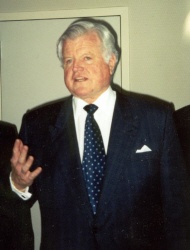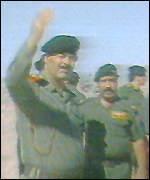Posted on May 9, 2006
Accomplished Liars
Libs fib about W's Iraq speech
by
Daniel Clark
On May 2nd, liberal reporters and politicians alike observed the third anniversary of President Bush's speech aboard the USS Abraham Lincoln. As long as they were recalling the occasion, it would have been helpful if they'd remembered what the president actually said that day, instead of tirelessly repeating the two words he didn't.

That Ted Kennedy (D, Mass.) claims to recall that Bush "dressed up in a flight suit and declared 'mission accomplished' in Iraq" is not surprising, coming from a man whose diary must read with all the realism of a Betty Boop cartoon. The senator's recollection of events is such that, if his Chappaquiddick speech had gone on one minute longer, it might have ended with him flapping his arms, and carrying himself away to the enchanted island of the marshmallow people.
What's alarming is that Kennedy's version of Bush's Iraq speech has come to be accepted as common knowledge. It's as if the entire country has become afflicted with Kennedy Memory Syndrome. Senate Minority Leader Harry Reid (D, Nev.) criticizes Bush for "donning a flight suit to declare 'mission accomplished' in Iraq." Sen. Barbara Boxer agrees that "the president said three years ago 'mission accomplished'." Those statements are blatantly false, but most people don't know it, because the falsehoods have been supported by media depictions of the event.

The words "mission accomplished" appeared not in the president's speech, but only on a banner that hung in the background. It was a congratulatory message for the crew of the aircraft carrier, who had accomplished their mission in the Persian Gulf, and were returning home. The positioning of the banner behind the president was taken to suggest also that a mission had been accomplished in Iraq, and why not? The U.S.-led coalition had, after all, successfully overthrown Saddam Hussein's government.
"Ask our troops in Iraq whether the mission has been accomplished," blustered Sen. John Kerry (D, Mass.), as the fabricated controversy gained traction several months later. This characterization ignores the undeniable fact that a mission had been accomplished, and instead embellishes the banner's message to say that the mission in Iraq was all over.
Although President Bush did declare, "In the battle of Iraq, the United States and our allies have prevailed," he did not suggest that our work there was finished. To the contrary, he said, "We have difficult work to do in Iraq. We're bringing order to parts of that country that remain dangerous."
In case there was any doubt that troubles remained ahead, he added, "The transition from dictatorship to democracy will take time, but it is worth every effort. Our coalition will stay until our work is done, and then we will leave and we will leave behind a free Iraq." In other words, the fact that the mission to depose Saddam had been successful did not mean that America had yet accomplished everything that needed to be done in Iraq. One would hope that Sen. Nuance wouldn't find that distinction too confusing.
While it has turned out not to be true that "major combat operations in Iraq have ended," as the president said at the time, he undoubtedly meant that remark in reference to combat against Saddam's conventional army, which the coalition had thoroughly routed. To the degree to which Bush failed to predict the scope of military operations in post-Saddam Iraq, he seems to have underestimated the tactical value of that country to international terrorists. Yet he realized, unlike his detractors, that a connection existed.

"The liberation of Iraq is a crucial advance in the campaign against terror," he said. "We have removed an ally of al-Qaeda and cut off a source of terrorist funding. And this much is certain: no terrorist network will gain weapons of mass destruction from the Iraqi regime, because the regime is no more."
There was a time when these remarks were considered his most controversial, but his critics have made little mention of them lately, and for good reason. Among the information gleaned from documentation in the Pentagon's HARMONY database is that Saddam operated no fewer than three terror training camps for foreign jihadists, that the Iraqi government initiated contacts with Osama bin Laden while he was still in the Sudan in the mid-Nineties, and that Saddam's regime funded, and coordinated with, the al-Qaeda affiliated group Abu Sayyaf in the Philippines.
Also included among these materials is a recording of Saddam's son-in-law, Hussein Kamel, boasting to the dictator about how thoroughly they had deceived the weapons inspectors about their WMD programs. "We did not reveal all that we have," he says. "Not the type of weapons, not the volume of materials we imported, not the volume of the production we told them about, not the volume of use. None of this was correct. They don't know any of this."
These and other revelations are making it more difficult by the day for the war's opponents to impugn the president's justifications for invading Iraq. What we're seeing now is that they're retreating to their fallback position, which is to argue instead that the war has been poorly executed. The fiction that Bush had prematurely declared an end to America's mission in Iraq is a critical component of this political offensive.
To nobody's surprise, CNN has taken an active role in this effort. The cable network recently conducted a poll which so drips with bias that one might wonder if the questions were personally written by Christiane Amanpour. The results show that only 9 percent of respondents believed the U.S. mission in Iraq had been accomplished. Obviously, the impetus for the poll was to rebuke President Bush for his supposedly false declaration of victory. In reality, Bush himself would have answered CNN's question in the negative, for reasons he'd clearly stated in his so-called "mission accomplished speech."
There is one politician, however, who would find himself among those 9 percent. That's Rep. John Murtha (D, Pa.), who wants to abandon Iraq under the guise of "redeployment." At a press conference last November, the congressman said that, "the United States and coalition troops have done all they can in Iraq," and that, "our military has accomplished its mission and done its duty." But the CNN story celebrating the polling results didn't even mention Murtha.
While Murtha has become a folk hero among anti-war Democrats, his Senate colleagues are putting his words in Bush's mouth, in order to claim that the president "misled" us. If that isn't misleading, then nothing is. By now, unfortunately, this distortion has filtered its way through the media, and spread throughout the general population.
Tempting as it may be to let elected Democrats and the liberal media take all the blame for disseminating the "mission accomplished speech" lie, the news-consuming public cannot be let off the hook, either. Inside politics or out, not that many people share Ted Kennedy's excuses for having such a faulty memory.
-- Daniel Clark is a Staff Writer for the New Media Alliance. The New Media Alliance is a non-profit (501c3) national coalition of writers, journalists and grass-roots media outlets.
The Shinbone: The Frontier of the Free Press